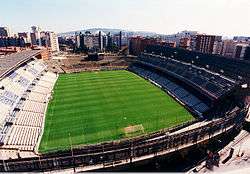Sarrià Stadium
 | |
| Coordinates | 41°23′35.20″N 2°07′59.41″E / 41.3931111°N 2.1331694°E |
|---|---|
| Owner | Espanyol |
| Operator | Espanyol |
| Capacity | 44,000 |
| Field size | 105 m × 70 m (344 ft × 230 ft) |
| Surface | Grass |
| Construction | |
| Built | 1923 |
| Opened | 18 February 1923 |
| Demolished | 20 September 1997 |
| Architect | Matías Colmenares |
| Tenants | |
| Espanyol (1923–1997) [1] | |
Sarrià Stadium (in Catalan: Estadi de Sarrià Catalan pronunciation: [əsˈtaði ðə səriˈa]; in Spanish: Estadio de Sarrià) was a football stadium in Barcelona, Catalonia, Spain. The stadium was the home of RCD Espanyol from 1923 to 1997, and was located in the district of Sarrià.
Beginning
The stadium was named after the road in which it was constructed, which linked Barcelona and Sarrià. Construction began on 31 December 1922 under the supervision of architect Matías Colmenares, and the cost was 170,000 pesetas. The initial forecast capacity was for 40,000 spectators, but due to the bankruptcy of the construction company the initial capacity was only for 10,000 spectators.
The opening game was played on 18 February 1923 with RCD Espanyol beating UE Sants 4-1, the first goal scored by Vicenç Tonijuan. In 1929 the club won its first Cup in Spain. On 10 February, at the stadium, 'Pitus' Prats scored the first goal of the first Spanish league title. However, although the club won several Catalan Championships they had to wait until 1940 before winning their second cup in Spain.
Successive enlargements
In 1948, Espanyol under club president Paco Saenz, repurchased the stadium, which until then belonged to Riva family, for 5 million pesetas.
In 1951 terracing behind the south goal was demolished, and a new grandstand was built which was overlaid in 1956. In 1960 floodlights were installed.
During the 1960s, several outstanding players such as Cayetano Re, Martial, Rodilla, Jose Maria and Peck played at the Sarrià Stadium, but especially noteworthy were Ladislao Kubala (1963–1964) and Alfredo Di Stefano (1964–1967) who finished his career there.
Manuel Meler, the president at the time, completed the southern tier raised above the new gallery, installed the lower side and reconstructed the north stand, all in twelve years.
The 1980s and 1990s
1982 World Cup
The most memorable moments in the history of the Sarrià stadium were when it hosted the 1982 FIFA World Cup. The stadium held the three matches of Group C in the second round round robin matches, with three of the favourites for the cup playing in this group: Argentina (Diego Maradona, Mario Kempes, Daniel Passarella), Brazil (Zico, Socrates, Falcao, Eder) and eventual champions Italy (Dino Zoff, Claudio Gentile, Marco Tardelli, Paolo Rossi, Giancarlo Antognoni). The key game was the third in which Italy defeated Brazil 3-2, in a match widely regarded as one of the best ever played at a World Cup. But the Sarrià stadium was heavily criticized for being too small to host these matches; as these matches were packed to capacity, unlike the Sarrià's sister venue, the Camp Nou stadium, which hosted 3 European teams (Belgium, Soviet Union and Poland) in the stage of round robin matches that stadium ended up hosting, and surprisingly none of the Camp Nou's second round robin matches contained more than 65,000 of the Camp Nou's 100,000 total capacity.
| Date | Team #1 | Res. | Team #2 | Round |
|---|---|---|---|---|
| 1982-06-29 | 2–1 | Group C (Second Round) | ||
| 1982-07-02 | 1–3 | Group C (Second Round) | ||
| 1982-07-05 | 3–2 | Group C (Second Round) |
Other events
The stadium held the first leg of the 1988 UEFA Cup Final, where Espanyol played Bayer Leverkusen.
Pink Floyd performed at the stadium during their A Momentary Lapse of Reason Tour on July 20, 1988 and three days later George Michael performed at the stadium with his Faith World Tour.
Sting performed at the stadium during The Soul Cages Tour on June 12, 1991.
The venue hosted five football matches at the 1992 Summer Olympics.[2]
Demolition and sale
The club's financial problems forced the company to sell the stadium to property developers. The last game played in Sarrià was against Valencia on 21 June 1997. Espanyol won 3-2 and the last goal was scored by visiting defender Iván Campo. The club then played at the Montjuic Olympic Stadium until 2009, when it moved to the Estadi Cornellà-El Prat.
External links
- Estadios de Espana(English)
